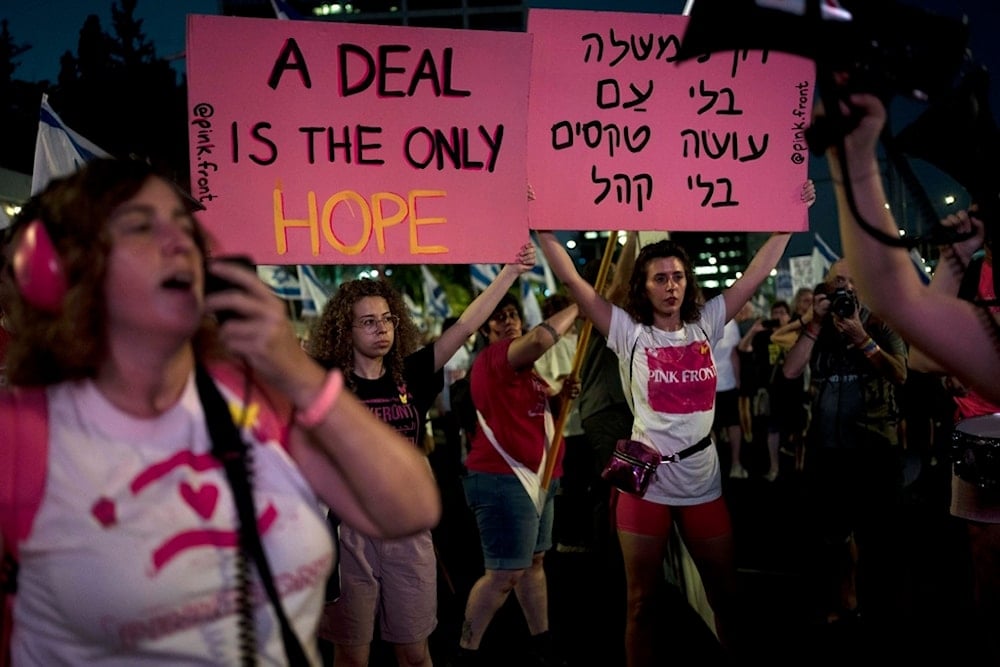Stance on Philadelphi Corridor spurs up Israeli infighting
Israeli officials reveal that a heated debate that included loads of shouting erupted between Netanyahu and other cabinet ministers over the Philadelphi Corridor.
-

Israeli settlers, some of whom are relatives of captives held by Hamas in Gaza, call for their immediate release and protest against Israeli Prime Minister Benjamin Netanyahu's government in Yaffa, occupied Palestine, Saturday, Aug. 24, 2024 (AP)
Israeli media reported an intense confrontation between Prime Minister Benjamin Netanyahu and Security Minister Yoav Gallant during a Cabinet meeting on Thursday as the Israeli occupation forces are mired in Gaza and the occupied West Bank.
The two exchanged heated words, with shouting escalating after Netanyahu unexpectedly proposed a vote on maintaining the Israeli military presence in the Philadelphi Corridor.
According to the Israeli news site Walla!, sources familiar with the matter revealed that the meeting began with Gallant presenting a detailed briefing. Gallant emphasized that the prisoner exchange deal was a "strategic turning point for Israel," warning that failing to reach an agreement could lead to broader consequences, including the potential for regional war.
However, the meeting took a dramatic turn when Netanyahu announced, unexpectedly, his intention to put the issue of the military's presence in the Philadelphi Corridor to a vote, sparking an intense debate within the Cabinet.
Gallant strongly opposed the decision, arguing that a formal decision by the Cabinet on this matter would hinder the occupation's negotiations over the prisoner exchange.
An Israeli official quoted Gallant as responding to Netanyahu's proposal by saying, "The Prime Minister has the authority to bring any decision to a vote, even executing prisoners." Gallant further argued that a formal decision to remain in the Philadelphi Corridor as part of the prisoner exchange would effectively hand over control of the occupation's strategic direction to Hamas leader Yahya Sinwar.
'Most heated debate'
Gallant clarified that if Sinwar did not relent on the Philadelphi Corridor issue, the Israeli regime would be forced to abandon one of its main war objectives: the retrieval of its captives.
"The choice is between staying in the Philadelphi Corridor and recovering the captives; both cannot be achieved simultaneously," Gallant warned, adding that ultimately, "Either we will discover that the captives have died, or we will have to back down from this decision."
A source familiar with the meeting told Ynet that it was a "trap set by Netanyahu for Gallant in the Cabinet regarding the Philadelphi Corridor," noting that the discussion became extremely uncomfortable, with voices being raised to unprecedented levels.
According to Yedioth Ahronoth, Netanyahu argued that Washington and Cairo had approved his maps, to which Gallant retorted that the talks were not with them but with Sinwar.
Two senior ministers described the clash between Netanyahu and Gallant as "the most serious confrontation between the two to date."
'Focus not on the Philadelphi Corridor'
Meanwhile, Israeli occupation forces Chief of Staff Herzi Halevi and Mossad Chief David Barnea expressed their reservations before the vote, though Netanyahu's office later denied this. According to two Cabinet sources who spoke to Walla!, Halevi remarked that a formal decision on this matter would be an unnecessary burden, further complicating the situation with the captives.
Barnea reportedly agreed, stating that it was "unnecessary at this time because the focus of the negotiations at this stage is not on the Philadelphi Corridor but on the lists of Palestinian prisoners to be released in the deal."
Doha talks on verge of collapse
The recent mediated negotiations between the Palestinian Resistance and the Israeli occupation in Doha have failed, with the talks now on the brink of collapse, a source in the Palestinian Resistance told Al Mayadeen.
According to the source, the meetings in Doha were unsuccessful in lifting the "veto" imposed on 65 Palestinian prisoners serving life sentences.
The source further disclosed that the negotiations were heading toward a complete breakdown due to the Israeli occupation's refusal to engage with the proposals put forth by mediators to address the plethora of unresolved issues.
Hamas has reportedly expressed that the negotiations, in their current form, will not yield any agreement.
The mediators involved in the talks are said to be deeply frustrated by the occupation's intransigent stance, which they believe is the primary obstacle in the negotiations. Additionally, the source noted that Washington is not exerting sufficient pressure on the Israeli regime, despite being aware that its positions are unjustified.

 4 Min Read
4 Min Read








